China is done. Well I suppose that technically I should say Mainland China is done, because Hong Kong really is part of China, and has been since 1987. However, I’m counting Hong Kong as a separate country because we had to pass through border controls to get in and they have different currency. Also because it’s really really different. So let’s take a few minutes to look back on country #23 and a few of the interesting things that never made it into a blog post.
----------
Huang has gave us a few elementary Mandarin lessons during our trip. At first it was kind of lame, but it turned out to be quite fun and informative. Chinese numbers are very simple – you really just have to learn the numbers zero through nine, and ten, hundred and thousand and you can make up any number you want. Want to say 12? It’s ten-two (shi-er). Twenty is two-ten (er-shi). And the Chinese use different finger symbols to indicate the numbers, and only need one hand to count up to ten. My favourite is the one for seven (chi) – it’s like the gesture you’d make when describing a puppet – a sort of fingers-chomping-against-thumb motion.
Of course Chinese pronunciation is legendarily subtle. The difference between the word for yes and the word for ten is all in how you inflect the vowel at the end. And interestingly, the word for no is actually a combination of two characters, meaning “not yes”. It seems highly appropriate to me that a culture so concerned with saving face and not causing offense doesn’t actually have a word that means no. It’s like they’re saying, “I don’t want to say no, but it’s not exactly yes either.”
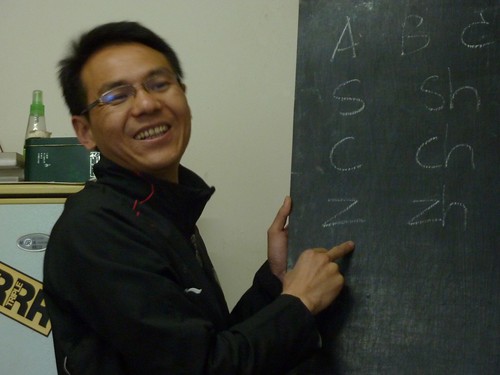 Huang trying to explain the subtle difference in pronunciation between s, sh, ch and zh. Good luck.
Huang trying to explain the subtle difference in pronunciation between s, sh, ch and zh. Good luck.
----------
I have thus far refrained from excessive comments on the toilet facilities I’ve run into. I’ve tried not to be all Western and high-and-mighty about squat toilets, reasoning that if I’d been brought up with them I’d probably find the Western variety odd and unhygienic. Indeed why would anyone want to set their butt down on the same ceramic that has been graced by hundreds who came before? But it’s time for me to render an opinion, and it is emphatically AGAINST squat toilets. Not because I’m not used to them. Not because they require more balance and dexterity than I sometimes feel like mustering. And not because I find it annoying to have to tuck my pant cuffs into my socks to stop them from trailing in… what’s left behind. It’s simply because there is stuff left behind for my pant cuffs to trail in in the first place. Western toilets may have their shortcomings, but at least the design is able to contain the vast majority of deposits entirely within the structure, a quality that squat toilets are sadly lacking. The state of a squat toilet at the end of a 17 hour overnight train journey is not fit to describe in a family blog. Enough said.
----------
And while we’re on the subject of toilet matters, I have to mention the Chinese practice of eschewing diapers for babies in favour of simply putting them in a pair of paints with a split up the back. This means the kid can squat whenever and wherever he needs to, and it means he spends no time in a dirty diaper. Like squat toilets, I suppose this makes sense on one level. I guess there’s less laundry to do, but I also wonder about the state of your priceless Persian carpets by the time the kid is toilet trained.
----------
Apparently it’s common practice for engaged couples in China to take their wedding pictures before the wedding. I know lots of couples in the West do this too, but I’m talking about WAY before the wedding, like up to a year. Huang says this is so they can show the photos to friends and family at the wedding, but that seems to be carrying things a bit too far. Are you supposed to try and look exactly the same on your wedding day? What if you change your hair? Or get some kind of disfiguring scar? Or what if you change your mind?
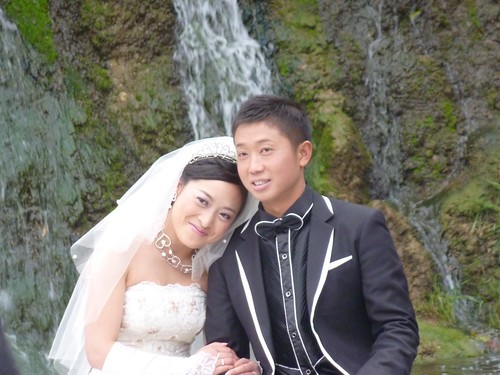 A young couple having their wedding photos taken at Emei Shan. Scheduled wedding date: June 1, 2017. First the Groom has to get old enough to shave.
A young couple having their wedding photos taken at Emei Shan. Scheduled wedding date: June 1, 2017. First the Groom has to get old enough to shave.
----------
More thoughts on the Chinese language: Have you ever wondered how the Chinese cope with computer keyboards? I did, and Huang explained. There are actually two different systems. The first is called ping yan. This involves typing the phonetic spelling of the Chinese word in English characters. So if Huang wants to type his name, he types H-U-A-N-G. Then the Chinese operating system pops up a menu of all the different characters that could match that spelling. Keep in mind that each vowel sound has four different possible inflections that can’t be rendered on the keyboard, so the average list of possible matches is about 20 characters long. For Huang, there’s “yellow” (which is the correct one in this case), and these other possible matches: emperor, hangover, fallow field, bed springs, house decoration, wander around, phoenix, grasshopper, blind, a name of a chemical, crickets, a sort of fish, and a word for sick. As you can imagine, this system is not terribly efficient.
Luckily, there’s another system called wu bi. With wu bi, each English letter on the keyboard corresponds to one common component of a Chinese characters. Most Chinese characters are made up of several other characters mashed together, sort of like a compound word. With wu bi, you have to learn what each English letter means and can then make up most Chinese characters. Good wu bi typists can type 100-150 words per minute.
Oh, and I saw a woman texting on her iPhone in the Hong Kong subway. When she wanted to write a Chinese character a little blank space popped up on her screen and she’d draw an approximation of the character there with her finger. Then a series of possible matches would appear along the side, and she’d pick the one she wanted. It was pretty cool.
----------
Lots of doorways in China have weirdly tall thresholds – not ones into regular shops and things, but certainly the doorways into temples, or palaces, and even into private home or hotels. Huang tells us there are two reasons for this. First, having to lift your feet higher is meant to force the entrant into a sort of bowing position, thus indicating humility, or in the case of a palace or temple, obeisance. The second reason is more fun – it’s to keep out Chinese ghosts! Unlike Western ghosts who fly around wherever they please, Chinese ghosts move around on the ground with their arms stretched straight out in front of them. And when they move, they do it with knees together in short hops. (Think of Frankenstein doing the bunny hop.) When confronted with a raised threshold, the hapless ghost is unable to enter and terrorize the inhabitants of the building, though what kind of terror he could actually inflict given his rather awkward form of movement is not clear.
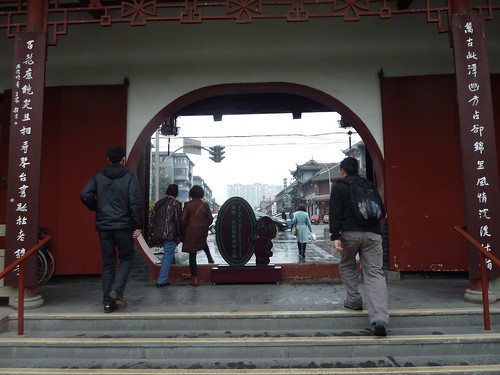 Stepping over the threshold at the entrance to a riverside park in Chengdu
Stepping over the threshold at the entrance to a riverside park in Chengdu
(Bonus fun Chinese threshold fact: It’s traditional when crossing the threshold to enter a Buddhist temple in China for men to lead with their left leg and for women to cross leading with the right.)
----------
You’ve probably all heard about China’s One Child policy, introduced in 1979 to help slow the explosive population growth in China. Well it turns out it’s not as simple as all that. Indeed, a couple living in a city is only allowed to have one child, but those living in a village are allowed to have two. And it’s not that the urban couple is prohibited from having a second baby, it’s just that if they do, they have to pay a hefty fee to the government. The steepness of the fee depends on the couple’s income and the size of the city. The higher the income and the bigger the city, the larger the fee, which can be up to 100,000 yuan (about $15,000). As you can imagine, wealthy people find it much easier to pay these fees.
And what happens if a second child is born and the parents can’t afford to pay the penalty? To start, it means the parents can’t register the birth officially. This means that when the child grows up and wants to get a job he can’t, because he doesn’t have an identity card. Huang says that sometimes people get desperate at this point and the parent and child will go down to the local police station and basically hang around for days on end until the police finally relent and issue a card just to get rid of them, though first they will check to make sure that the family involved truly can’t afford to pay.
And now I’m sure you’re thinking, “What happens if a woman has twins? Or triplets?” My question exactly. Huang says that the government does not assess the fee in the case of multiple births, reasoning that it’s not something that could be predicted or prevented. As a consequence, it’s considered very lucky to have twins.
----------
McDonald’s seems to be everywhere in China, and I have to say that’s not a bad thing at all. I started this trip all high-and-mighty about McDonald’s. I never went there much at home, why would I do it when I was traveling? I wasn’t going around the world just so I could make a dash for the nearest Big Mac whenever I got somewhere new! Well I’m here to tell you that sometimes McDonald’s is exactly what you need. They are clean, and consistent, and brightly lit. The food may not be the best or the healthiest, but at least you know what you’re getting. And the bathrooms are always excellent, which by itself would be enough to warrant a visit sometimes. So I say three cheers for the clown, and thanks for being there when I need you.
 The McDonald’s in beautiful downtown Yangshuo. And yes, I did eat there.
The McDonald’s in beautiful downtown Yangshuo. And yes, I did eat there.
----------
We had a bit of a streak (well, two) of hotels with a strange concept of bathroom privacy. First in Xi’an and then in Chengdu the walls of the bathrooms in the hotel rooms were made of glass. In both cases there were blinds that could be drawn over the majority of the wall, but really, what the Hell? What kind of moron designs a bathroom with glass walls? I was lucky that I had the room to myself, but what if I’d been paired with someone I’d only met a few days earlier? How comfortable would that be? The hotel in Chengdu was a particularly bad offender, because not only were both walls glass, there wasn’t even a proper door, just a curtain. Whatever designer came up with that abomination should be made to perform his morning ablutions in a glass-walled bathroom at the corner of Yonge and Bloor in downtown Toronto and then maybe he’d smarten up.
 My bathroom in Xi’an. Seriously?
My bathroom in Xi’an. Seriously?
----------
More on Chinese language: There are about 56,000 Chinese characters, and the most complicated one takes 56 strokes to complete. At first I thought that Chinese was a very elegant and efficient system, but it seems that because may characters take so many different strokes to draw it’s not hugely faster than the Roman alphabet. The most complicated Roman letters take a maximum of four strokes to draw, so while we use a lot more characters, we can write them a lot faster.
Other language trivia? Though there are 56,000 characters, that would be like the equivalent of the entire contents of the OED and the majority of them are archaic. A well educated Chinese person might know and use between 6,00 and 8,000 characters. Being able to read a daily newspaper requires you understand about 2,000 –3,000.
----------
I’ve mentioned our tour leader, Huang, quite a few times in my posts about China. He was always there for us – when Sarah had her wallet stolen in Xi’an, when I had to be rescued from the docks on the banks of the Yangzi, and whenever anyone needed an ATM, or a local laundry, or directions to the closest reasonable toilet. His English is good, and he’s knowledgeable, and he’s fun, even if he’s not very good at Uno. But regardless of his questionable Uno skills, I’d say he’s a good guy to have around when you’re touring China. It turns out that Huang has a tour company of his own, so I’m happy to mention it here. If you’re looking for someone to get you around China, translate, educate, and find the good dog restaurants, check out Truly China Travel. Ask for Huang Yunhua.
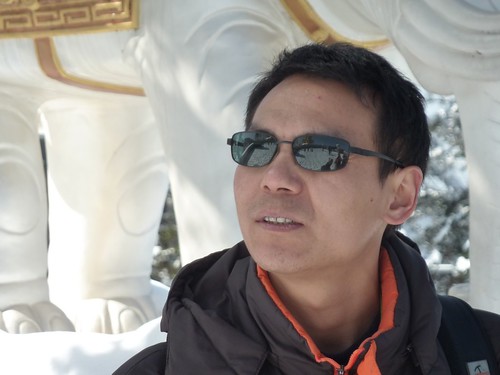 Huang, looking all Movie Star with his dark glasses, on a snowy morning at the Golden Summit of Emei Shan
Huang, looking all Movie Star with his dark glasses, on a snowy morning at the Golden Summit of Emei Shan
----------
And since we’re in endorsement mode, I also have to mention my travel agent back in Canada, something I should have done months ago. Cathy at Portage Travelcuts was there for me from the very beginning of the idea for this crazy trip. She helped me understand the quirks of Around the World tickets, and she answered my stupid questions about, well, about anything. Cathy is also a friend and fellow runner and whether we were out on a run, or sitting in a bar, or wherever Cathy was happy to chime in. She got me my rail passes, she booked my tours, and she answers my late-night emails about extra nights at hotels and itineraries for Southeast Asia and visas and whatever. So if you're in Winnipeg and you want to get out book your flight or Intrepid tour or Caribbean vacation with Cathy at Portage Travelcuts, not just because she’s my friend, but because she gets it.
----------
Ok, enough endorsements, and enough China. I’m in Hong Kong, and I’m loving it. My enthusiasm is back, and I’m enjoying seeing the city and planning the next leg of the trip. Look for the first post about Hong Kong soon.
One last bonus Chinglish sign. This one is from a menu in Beijing. Menus in general are a rich source of Chinglish, but this one is frankly beyond any possible interpretation:
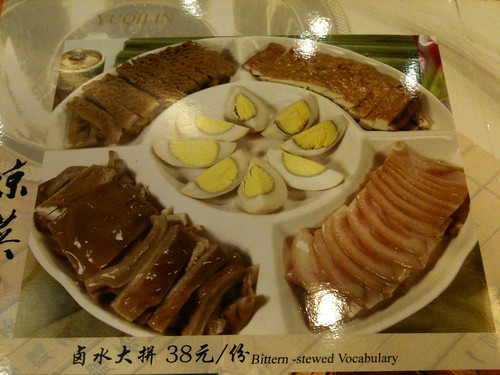



3 Comments:
Wasn't it 1997 when China took over Hong Kong? ;)
I experienced squat toilts when I travelled Europe in 1989...and I totally agree with you!
p.s. I second the "Cathy @ Travel Cuts endorsement"...She knows her stuff inside and out. She's never steered me wrong!
Glad to hear ya gots yer mojo back!
Post a Comment